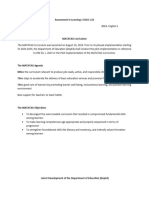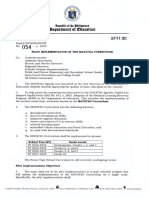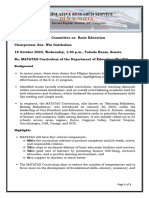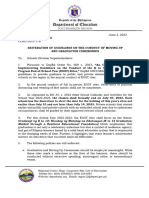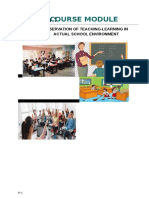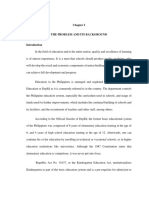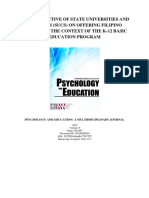MATATAG Curriculum
The Department of Education (DepEd) remains committed to fulfilling its mandate of providing
appropriate, responsive, and relevant basic education as stipulated in Republic Act (RA) No.
10533, also known as the Enhanced Basic Education Act of 2013. To effectively fulfill this
mandate, DepEd strives to craft a well-designed curriculum grounded on empirical research and
aligned with the national vision of quality education for all basic education learners.
A comprehensive review of the K to 12 Basic Education Program has revealed several issues,
such as overcrowded curriculum, misaligned learning competencies, and imbalanced cognitive
demands. To respond appropriately to the issues and challenges faced by the K to 12 Program,
DepEd introduced the MATATAG Curriculum.
The MATATAG Curriculum streamlines competencies to ensure logical progression, prioritize
21st century skills, improve foundational literacy and numeracy skills, and cultivate future-ready
skills needed in the job market. More importantly, it aims to holistically develop lifelong and
peace-loving Filipino learners by placing a strong emphasis on values formation, ensuring the
development of competent, job-ready, and responsible citizens, who embody the core values of
Maka-Diyos, Makatao, Makakalikasan, and Makabansa.
Aligned with the aspirations of the country for the Filipino learner as articulated in the Ambisyon
Natin 2040 and supported by the National earning Recovery Plan (NLRP) and Basic Education
Development Plan (BEDP) 2030, the MATATAG Curriculum fosters inclusivity by integrating
global citizenship and respect for diversity. It promotes a future-thinking mindset that empowers
learners to embrace and shape change while cherishing their national identity and sense of
nationhood.
Ambidyon Natin 2040 is long-term vision project proposed by the National Economic and
Development Authority (NEDA) in early 2015. This project is envisioned to be a basis of unity
among Filipinos where we generally want the Philippines to be by 2040, and serve as a guide in
development planning across administrations.
The MATATAG Curriculum has sought to do the following:
a. Ensure that every learner is equipped with life skills;
b. Instill the value of citizenship and unity in diversity and work effectively with others;
c. Educate all Filipino learners to handle the challenges of everyday life and respond
effectively to disasters and emergency situations;
d. Prepare them to thrive in a global human resource market so that they can contribute
effectively to nation-building and economic development; and
e. Foster critical and creative thinking in Filipino learners by working collaboratively with
peers towards identifying problems and challenges that may impact the present and the
future, finding and designing solutions for them; and engaging in activities that
encourage thinking out of the box.
� The MATATAG Curriculum incorporates relevant provisions from the recent basic education
reforms, including RA 10410 or the Early Years Act of 2013, RA 0157 or the Kindergarten
Act, RA 10968 or the Philippine Qualifications Framework (PQF) Act, RA 11510 or the
Alternative Learning System (ALS) Act, RA 11476 or the GMRC and Values Education Act,
RA 11650 or the Instituting a Policy of Inclusion and Services for Learners with Disabilities
in Support to Inclusive Education Act, and RA 11713 or the Excellence in Teacher Education
Act.
Through the MATATAG Curriculum, DepEd reiterates its commitment to ensure that the
country's basic education is aligned and at par with global education standards. This
continual commitment aims to meet international benchmarks and quality standards and to
contribute significantly to achieving the United Nations Sustainable Development Goal (UN
SDG) 4, which emphatically ensures inclusive, equitable quality education and promotes
lifelong learning opportunities for all.
Through rigorous quality assurance mechanisms, which include regular curriculum reviews
involving various stakeholders, the MATATAG Curriculum is committed to continuous
improvement to address new and emerging needs of the times. It reflects the collective
aspiration of our nation to uplift the quality of Philippine basic education in support of the
government's development roadmap toward improving the lives of Filipino families.
IMPLEMENTATION
MATATAG Curriculum shall be implemented by phase starting with Kindergarten, Grades 1, 4,
and 7 in School Year (SY) 2024-2025. For other grade levels, the curriculum shall be
implemented as follows: Grades 2, 3, 5, and 8 in SY 2025-2026; Grades 6, 9, and 10 in SY 2026-
2027. The policy guidelines for Grades 11 and 12 shall be covered by a separate issuance from
DepEd.
�a. This Order shall be implemented by all schools in the country, including those in
administrative and autonomous regions, and those Philippine schools overseas (PSOs) that offer
basic education. These schools include, but are not limited to, all public and private schools, state
universities and colleges (SUCs), and local universities and colleges (LUCs).
b. The MATATAG Curriculum shall serve as the fundamental blueprint for teachers at the
classroom level, enabling them to align their lesson plans with content and performance
standards, appropriate learning competencies, pedagogies, assessments, and resources required to
achieve the desired learning outcomes for Filipino learners.
c. It shall help instructional leaders create supervisory and management plans to oversee
instructional delivery, provide appropriate technical and other forms of assistance to teachers and
school heads, and monitor learning gains.
d. Parents and other external education stakeholders shall be given direction and opportunity to
support the MATATAG Curriculum in achieving its goals.
e. Recognizing the particular context and educational concerns of diverse learners, the
MATATAG Curriculum shall be contextualized in implementing the different inclusive education
programs, such as, but not limited to, Special Needs Education (SNEd), Madrasah Education
Program (MEP), and Indigenous Peoples Education Program (IPEd). The Special Curricular
Program (SCP) shall complement the MATATAG Curriculum to cater to the needs of learners
with potential, skills, and talents. At the same time, the curriculum of the ALS shall be aligned
with the MATATAG Curriculum. Existing policy guidelines on the curriculum of the different
inclusive education programs and ALS shall remain in effect until revised, rescinded, or
repealed.
DEFINITION OF TERMS
For purposes of this Order, the following terms are defined and understood as follows:
Blended Learning refers to the thoughtful integration of classroom face to face or in-person
learning experiences with online learning experiences (Garrison and Kanuka, 2004).
Competency refers to a specific skill performed with varying degrees of independence. It has
different degrees of difficulty and performance levels. It also refers to the ability to perform
activities according to the standards expected by drawing from one's knowledge, skills, and
attitudes (DepEd Order [DO) No. 021, s. 2019, Policy Guidelines on the K to 12 Basic Education
Program).
Content refers to the scope and sequence of topics and skills covered in each strand/ domain /
theme /component of a particular discipline/learning area, curriculum, or instructional material.
�Curriculum refers to the set of formal documents that determines content, learning, teaching,
and assessment by describing the what, the why, the how, and how well learners shall learn and
by ensuring that these elements reflect the principles of quality, equality, inclusion, and relevance
(IBE-UNESCO, 2013).
Curriculum Goals refers to the broad statement/s that articulate what learners should lcarn and
accomplish in the different learning areas, grade levels, and specific areas of study.
Developmental Domains refers to specific aspects of growth that cover but are not limited to the
following: socio-emotional, values, physical health, motor, aesthetic/creative, cognitive and
literacy, language, and communication.
Foundational Skills refers to the necessary skills and competencies for higher learning that
learners need to develop, including basic literacy and numeracy skills.
Instructional Model refers to the guide for implementing the intended curriculum. More
specifically, it refers to the structure of teaching strategies, methods, and activities that address
specific instructional goals and objectives.
Key Stage refers to the stages in the K to 12 Program reflecting distinct developmental
milestones. These are Key Stage 1 (Kindergarten to Grade 3) Key Stage 2 (Grade 4 to Grade 6),
Key Stage 3 (Grade 7 to Grade 10), and Key Stage 4 (Grades 1l and 12). Assessment of learning
is critical at the end of each stage.
Key Stage Standards refers to the quality of proficiency that the learner can demonstrate in
each key stage.
Learning Outcomes refer to clear statements of what a learner can be expected to know,
understand, and/or do as a result of the learning experience (Implementing Rules and
Regulations [IRR] of the PQF Act).
Pedagogical Approaches refers to the set of principles, beliefs, or ideas about the nature of
learning that serve as the basis for teaching practices and learning experiences.
Pedagogical Approaches refers to the set of principles, beliefs, or ideas about the nature of
learning that serve as the basis for teaching practices and learning experiences.
Performance Standards refers to the expected proficiency level expressed in two ways: 1)
learners should be able to use their learning or understanding in real-life situations; and 2) they
should be able to do this on their own. Evidence includes their products and performances (DO
31, s. 2012, Policy Guidelines on the Implementation of Grades 1 to 10 of the K to 12 Basic
Education Curriculum BEC) Effective School Year 2012-2013).
Phased Implementation refers to the gradual implementation of the MATATAG Curriculum for
different grade levels beginning SY 2024-2025.
�Skill refers to the coordinated performance of related tasks with a certain degree of facility.
Standard refers to what one should know and be able to do.
21st Century Skills refer to the knowledge, skills, attitudes, and competencies that learners need
to develop to succeed in work and life in the 21st century. These skills are deemed essential for
the digital and rapidly changing economy. 21st century skills encompass methods of thinking,
working, and living rather than focusing on specific subject knowledge.
POLICY STATEMENT
Paragraph 10.2 under Rule II of the IRR of RA 10533 or the Enhanced Basic Education Act of
2013 outlines the standards and principles for developing a basic education curriculum. It
emphasizes the importance of a learner-centered, inclusive, and developmentally appropriate
curriculum while also being gender- and culture-sensitive. The curriculum encourages the use of
constructivist, inquiry-based, reflective, collaborative, and integrative pedagogical approaches. It
ensures logical progression of content for mastery of these at each level. Furthermore, the
curriculum is designed to be adaptable to local and global contexts, allowing schools to localize,
indigenize, and enhance according to their unique educational and social contexts.
Aligned with the provisions of RA 10533, the MATATAG Curriculum prepares learners for the
future by integrating contemporary themes and issues, fostering 21st century skills, promoting
inclusivity, and encouraging futures thinking. The larger goal is to inspire all Filipino learners to
take pride in their nationality, be skilled in their chosen fields, and be capable of contributing to
society while considering sustainability and global partnerships. The curriculum standards ensure
mastery of concepts, lifelong learning, and competence to thrive in the 21st century environment.












